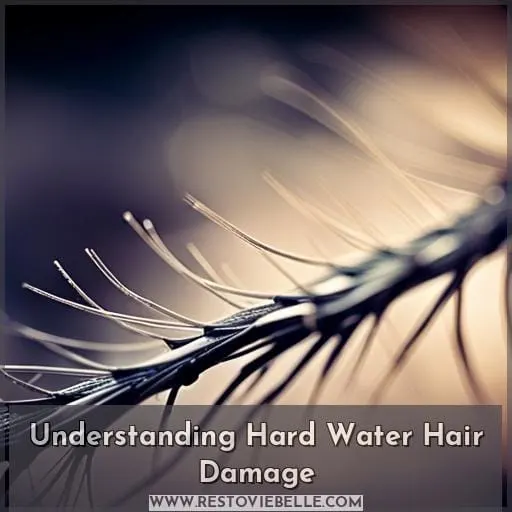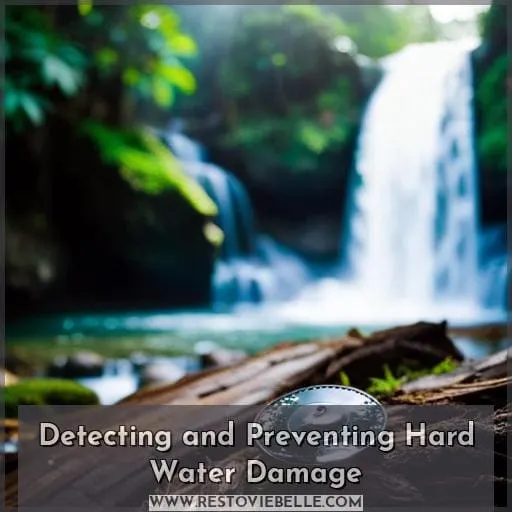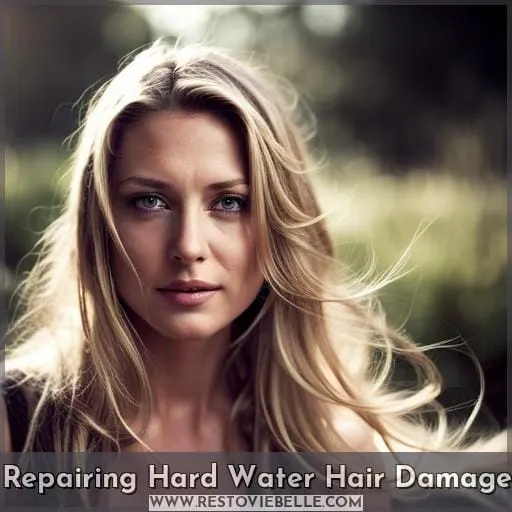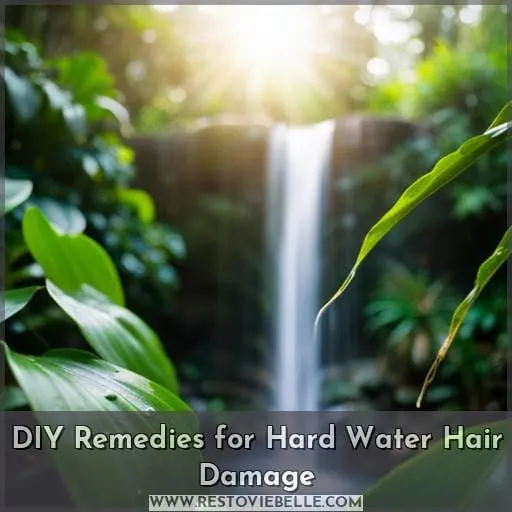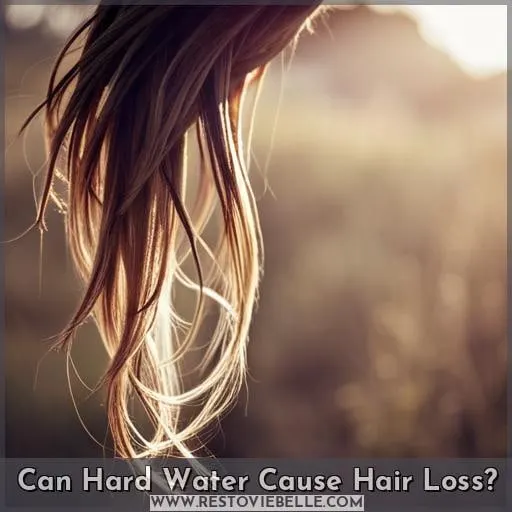This site is supported by our readers. We may earn a commission, at no cost to you, if you purchase through links.
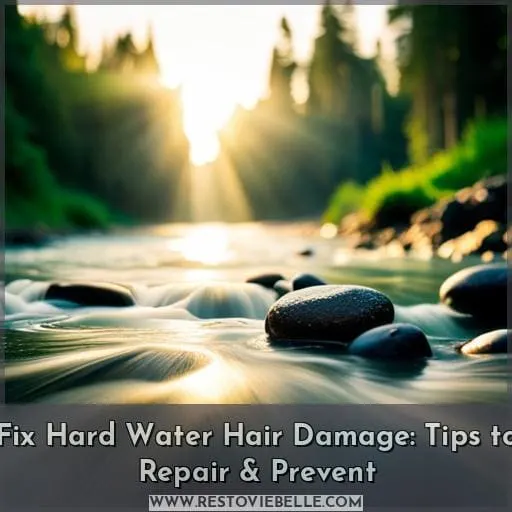 Do you know what hard water is doing to your hair? Hard water contains minerals like calcium and magnesium which leave a film on the strands, making it difficult for moisture to penetrate. This results in dryness and breakage, as well as potential hair loss if left untreated.
Do you know what hard water is doing to your hair? Hard water contains minerals like calcium and magnesium which leave a film on the strands, making it difficult for moisture to penetrate. This results in dryness and breakage, as well as potential hair loss if left untreated.
But don’t worry – here are some tips that can help repair and prevent damage from hard water! Learn how to test for hardness levels, use specialized treatments or DIY remedies such as baking soda washes or apple cider vinegar rinses.
Plus, find out important information about the long-term effects of mineral buildup on hair health.
We’ve also got recommendations for products that make testing easy, plus shower filters that revitalize skin and restore balance – so you can start fixing your hard water hair damage today!
Table Of Contents
- Key Takeaways
- Understanding Hard Water Hair Damage
- Detecting and Preventing Hard Water Damage
- Repairing Hard Water Hair Damage
- DIY Remedies for Hard Water Hair Damage
- Addressing Long-Term Concerns
- Recommended Product: Water Hardness Test Strips
- Recommended Product: AquaBliss Shower Filter
- How to Know if You Have Hard Water
- How to Prevent Hard Water Damage
- Can Hard Water Cause Hair Loss?
- Frequently Asked Questions (FAQs)
- Conclusion
Key Takeaways
- Hard water containing minerals like calcium and magnesium can cause damage to hair.
- Mineral buildup on hair can lead to dryness, breakage, and potential hair loss.
- Different hair types, especially curly or color-treated hair, are more susceptible to hard water damage.
- Preventive measures such as using sulfate-free products, deep conditioning treatments, and protective styling can help manage hard water hair damage.
Understanding Hard Water Hair Damage
If you’re noticing dry, dull, and tangled hair that won’t seem to improve no matter what products or treatments you use, it might be time to consider hard water. Hard water contains minerals like calcium and magnesium, which can leave mineral residue on your hair as it dries.
This buildup of minerals leads to damage such as breakage. Porous, chemically treated, or curly hair is especially vulnerable. Some signs include mineral deposits on your faucets and glassware, along with low water pressure when showering – if any of these sound familiar, then hard water may be an issue for you.
Impact of Mineral Buildup on Hair
You can see the impact of mineral buildup on your hair — like a hard shell that’s cracking and breaking with every movement — when you look closely. Detecting signs such as mineral deposits on faucets, glass, or low water pressure is key for mitigating damage.
Preemptive care includes installing showerhead filters and using chelating shampoo to remove minerals from hair. Regular use of hair masks nourishes damaged strands, while deep conditioning treatments address dryness and brittleness caused by hard water exposure.
Finally, protective styling can reduce further harm done by harsh minerals in the long run.
Signs and Symptoms of Hard Water Damage
Discover the tell-tale signs of hard water damage on your hair, such as mineral deposits on faucets and glass, low water pressure when showering, difficulty lathering up, dryness, and tangles. Hard water’s calcium and magnesium can build up in porous or curly hair as it dries.
Install a showerhead filter to reduce mineral content or try chelating shampoos containing EDTA for maximum effect.
To prevent future issues, opt for sulfate-free products. Additionally, regular deep conditioning treatments will nourish damaged locks, while club soda clarifies frizz-prone tresses without drying them out further.
Vulnerability of Different Hair Types
Different hair types are prone to varying levels of hard water damage, so it’s important to assess your unique vulnerability. Porosity, texture, and chemical buildup all play a role in how much mineral deposits and product buildup can affect your locks.
Curly or color-treated hair is more susceptible to the effects of hard water than straight strands.
Softening treatments like deep conditioning masks help balance pH levels, while protective styling shields fragile tresses from further harm. Water softeners reduce mineral content, which helps protect not only appliances but also delicate strands from breakage due to dryness or tangling caused by excessive buildup.
Long-term concerns, such as hair loss, may be addressed through consultation with professionals for an effective solution that suits individual needs best.
Detecting and Preventing Hard Water Damage
Understanding hard water hair damage can be prevented with the right approach. To detect and protect against mineral buildup, testing for water hardness levels is essential. Installing a showerhead filter helps reduce mineral deposits. Pre-shampoo treatments minimize further buildup.
Choosing sulfate-free products specially formulated for color-treated or chemically processed hair is an important step to take. With these solutions in place, you can ensure that your hair remains healthy and free from the damaging effects of minerals in hard water.
Testing Water Hardness
Testing your water hardness is key to understanding the extent of hard water damage and developing an effective plan for prevention. Invest in a T3 Hard Water Softener, install a shower head filter, or use test strips to measure pH balance.
For long-term solutions, consider deep conditioning treatments, hair masks with club soda rinses, and protective styling. Professional advice may be needed if you experience excessive hair loss from mineral buildup – this could indicate more severe issues that can’t be fixed at home.
- Test strips measure pH balance.
- Use T3 Hard Water Softener for long-term solutions.
- Consider deep conditioning treatments and protective styling.
Installing a Shower Head Water Filter
Installing a shower head water filter can be like pouring oil on troubled waters and help restore your hair to its former glory. The filter is designed to reduce mineral buildup, preventing the crystallization that leads to dry, brittle hair.
Regular tests will indicate when it’s time for treatment or replacement of the shower filtration system.
Water softeners also benefit appliances as well as providing relief from hard water-related issues like metal binding in shampoos and conditioners. Metal removal products, such as pre-shampoo treatments, are available but may not be enough if you’re dealing with regular mineral deposits.
Hair care products specifically formulated for hard water environments contain chelating agents that bind minerals so they don’t bond with other molecules in shampoo or conditioner. These should form part of your routine along with any additional measures taken, such as deep conditioning treatments or protective styling techniques, which can minimize exposure to harmful minerals found in hard water.
Pre-shampoo Treatments to Minimize Mineral Deposits
To protect your mane from mineral buildup, consider pre-shampoo treatments to reduce deposits before they become a problem. Water softeners can help by reducing water hardness and protecting hair from damage.
Hair masks fortified with essential oils and vitamins are great for nourishing dry strands caused by hard water. A boar bristle brush is ideal for evenly distributing oil on the scalp, while citric or vinegar rinse helps soften hair when used in moderation.
Tetrasodium EDTA shampoos may also be beneficial as they bind minerals together, allowing them to be washed away easily. Adding apple cider vinegar and lavender extract to the shampoo can minimize irritation and inflammation of the scalp due to hard water use.
Choosing the Right Hair Products
Choosing the right hair products can make or break your hard water hair damage repair plan. For example, using a sulfate-free shampoo with EDTA will help remove mineral deposits and restore shine to chemically treated curls.
Water softeners reduce water hardness for healthier appliances and tresses, while club soda clarifies locks without stripping them of natural oils. Boar bristle brushes evenly distribute sebum throughout strands while also removing build-up from the scalp and roots.
Hair masks provide deep conditioning benefits that nourish all types of textures; diluted acid rinses offer similar pH balancing effects but should be used sparingly as they are quite acidic in nature!
Investing in quality hair care products is essential to restoring damaged locks due to hard water.
Repairing Hard Water Hair Damage
Are you looking for ways to repair hard water hair damage? Weekly use of clarifying shampoo, specialized hard water treatment kits, water softeners for reducing hardness levels, citric acid rinse for softening hair, and leave-in conditioner or oil as protection are all effective methods.
Not only will these strategies help reduce the effects of mineral buildup on your tresses, but they can also restore shine and strength to damaged locks.
Weekly Use of Clarifying Shampoo
Using a clarifying shampoo weekly can help remove mineral deposits and restore lost moisture to hard water-damaged hair.
Deep conditioning treatments address dryness, while regular hair masks nourish and soften strands. Citric acid rinses may also be used in moderation for additional softening effects, followed up with leave-in conditioner or oil to shield the locks from further damage.
A boar bristle brush evenly distributes oils on the scalp without causing breakage or frizziness.
Sulfate-free shampoos are ideal for color-treated hair that has been damaged due to the high mineral content of hard water, so choose wisely! Reversing damage is possible when one understands how it occurred in the first place.
Specialized Hard Water Treatment Kits
You can take your hard water hair damage woes to the next level with a specialized treatment kit! Water softeners reduce hardness and benefit both hair and appliances, while EDTA shampoos clarify mineral deposits.
Citric acid rinse in moderation helps soften strands, boar bristle brushes even out oil distribution for scalp care, and deep conditioning treatments target dry, brittle locks. Sodium’s role in balancing pH levels is key for healthy hair; consider regular masks to nourish it further.
Water Softeners for Reducing Water Hardness
Installing a water softener can make all the difference in restoring your hair’s health and shine. Water softening systems reduce mineral buildup, preventing damage from hard water. Additionally, softer water improves lathering capability and reduces dry scalp symptoms caused by excess minerals.
Softened water is also beneficial for color-treated hair as it helps preserve hair color longer than normal tap water would do on its own. With a high-quality system installed at home, you’ll have access to clean, softened water.
Citric Acid Rinse for Softening Hair
A citric acid rinse can help to soften and nourish your tresses, restoring their natural vibrancy. An acidic solution of this compound works to remove hard water minerals from the hair shaft while also providing a protective coating against further damage.
Its benefits extend beyond softening as it helps conditioners work more effectively and boosts shampoo lather. It also reduces filmy deposits on the scalp and strands for curly hair types, enhances hair’s elasticity and shine, all while protecting them from further mineral buildup.
Leave-in Conditioner or Oil for Protection
To protect your hair from hard water damage, apply a leave-in conditioner or oil to keep it soft and nourished. The chelation process helps remove mineral buildup while restoring moisture retention. A pH balance is also necessary for impurity removal and scalp conditioning. Consider pre-shampoo treatments or an apple cider vinegar rinse along with deep conditioning treatments for further protection, as well as a water softener to reduce hardness levels in the long term.
Hair masks are beneficial too, providing essential nutrients that undo any damage caused by hard water buildup over time.
DIY Remedies for Hard Water Hair Damage
You can quickly repair hard water hair damage with a few simple DIY remedies. Try using baking soda mixed with water as a wash for your hair, followed by conditioner. Use regular hair masks to nourish and soften. A diluted apple cider vinegar rinse removes mineral deposits.
A boar bristle brush distributes oils evenly throughout the strands of your hair, while club soda clarifies when used occasionally. These tips will help you restore health and luster to dry or brittle locks damaged by hard water minerals.
Baking Soda Hair Wash Followed by Conditioner
For an effective repair, try a baking soda hair wash followed by conditioner to clarify and soften hard water-damaged locks. Baking soda helps remove mineral buildup from the scalp and strands while balancing pH levels.
Conditioning treatments, such as deep conditioning or protein masks, can help restore moisture and strength to hair that has been damaged due to hard water exposure. Natural remedies like apple cider vinegar rinses are also beneficial for removing minerals, combating dryness, minimizing breakage, and improving the overall texture of tresses affected by hard water causes of hair loss.
Regular Use of Hair Masks
Regularly treating your hair with a nourishing mask can help keep hard water damage at bay, much like an ounce of prevention is worth a pound of cure.
Moisturizing masks enriched with natural oils provide intense hydration and heat protection for strands that are prone to dryness. Nourishing oils, such as argan oil or jojoba oil, also coat the scalp and prevent mineral buildup from occurring again.
Hard water kits containing chelating shampoos combined with deep conditioning treatments are also helpful in reversing existing damage caused by mineral deposits on hair.
Aloe vera gel mixed with lavender extract is another great option for restoring moisture into porous strands, while an apple cider vinegar rinse helps balance pH levels too.
Investing time and money in haircare products specifically designed to address hard water issues will ensure healthy-looking tresses all year round!
Diluted Apple Cider Vinegar Rinse
Try a diluted apple cider vinegar rinse for your hair to help balance pH levels and reverse damage. It’s an effective DIY treatment that removes mineral deposits, while also providing oil protection against hard water.
For porous or chemically treated hair, consider adding lavender extract for extra nourishment. When using this acid rinse, be sure to follow up with a deep conditioning treatment as it can strip moisture from the strands if used too often.
Always consult professional advice before attempting any hair-washing techniques involving harsh chemicals or acids and ask about other options available specifically designed to address hard water problems.
This will prevent further damage caused by imbalanced pH levels in your water supply.
Boar Bristle Brush for Oil Distribution
To nourish your hair and restore its natural shine, use a boar bristle brush. Studies show that it can reduce frizz by up to 62 percent! Boar bristles are gentle yet effective in distributing oils evenly across the scalp while removing mineral buildup from hard water.
This helps condition hair and protect against thinning due to damage caused by high levels of calcium or magnesium deposits. Follow with an apple cider vinegar rinse for maximum results, then apply conditioning products as needed for additional protection and hydration.
With regular maintenance using these simple tips, you’ll keep your locks healthy even when exposed to hard water!
Club Soda for Clarifying Hair
Using club soda to balance the pH of your hair and reduce frizz can help clarify strands, leaving them looking healthier. Its benefits are similar to a vinegar rinse as it works by removing mineral buildup from hard water.
For best results, use in moderation with deep conditioning treatments for maximum restoration. Protective styling is also important for preventing future damage caused by hard water and scalp issues due to its high mineral content affecting hair growth.
Regularly testing water quality will ensure you have the right products on hand when needed, leading to better hair health overall.
Addressing Long-Term Concerns
Hard water can contribute to hair loss in an indirect way due to mineral buildup. If you’re experiencing excessive hair loss, it’s important to seek professional advice from a qualified trichologist or dermatologist.
Understanding the impact of hard water on your scalp and strands is key to preventing long-term damage and restoring healthy locks.
Indirect Contribution of Hard Water to Hair Loss
Hard water can cause hair loss indirectly by building up minerals on the scalp, leading to breakage and thinning. Installing a water softener or using an acidic rinse are some solutions to reduce mineral concentration.
Professional advice is recommended if excessive hair loss occurs as this may require more targeted treatments, such as lavender extract, for prevention of further damage.
Hair care products specifically designed for hard water can also be used to prevent damage while reducing mineral deposits and restoring healthiness. Softening the water before use helps keep hair hydrated, smooth, and healthy, even with high levels of minerals present in it.
Applying leave-in conditioners or oil shields against future buildup is also beneficial.
Hair masks nourish damaged follicles caused by hard water, while avoiding harsh chemicals that only worsen the problem.
Seeking Professional Advice for Excessive Hair Loss
If you’re concerned about excessive hair loss due to hard water, seeking professional advice is the best way to restore your locks’ luster. To treat hard water effects on hair and maintain its quality, consider using a water softener or pre-shampoo treatments like chelating shampoos and apple cider vinegar rinses.
Hair masks can nourish dry strands while boar bristle brushes aid in evenly distributing oil throughout tresses for added protection from mineral build-up.
For color-treated hair, opt for sulfate-free products as those are less likely to strip away natural oils that protect the scalp and strands from damage caused by hard water minerals.
Recommended Product: Water Hardness Test Strips
By using a Water Hardness Test Strip, you can easily and quickly assess the damage hard water has caused to your hair. This cost-effective testing method will provide reliable results within seconds that identify potential issues before they become a problem.
The clear color indicator scale offers accurate readings of mineral buildup from mineral-rich water, allowing you to take proactive measures in combating hard water damage. Water softeners reduce these levels, benefiting both hair health and appliances around the house.
Hair masks nourish and soften while citric acid rinses can help soften strands; however, use them in moderation as it’s an acidic ingredient! Additionally, shampoos with EDTA are great for removing minerals found on locks, while sulfate-free products protect colored tresses from further deterioration due to poor quality H2O.
To maintain healthy tresses, ensure regular deep conditioning treatments are used along with protective styling methods that minimize exposure of vulnerable strands to harsh waters!
Recommended Product: AquaBliss Shower Filter
Take your shower experience to the next level with the AquaBliss Shower Filter. It revitalizes skin, hair, and nails from its first use. The multi-stage filtration system removes sediment filters, reduces chlorine for low water pressure, and balances pH.
This helps reduce hairspray flakes and manage scalp irritation caused by hard water. The advanced filter also infuses beneficial minerals into skin, hair, and nails while neutralizing odors.
Installing the AquaBliss Shower Filter is easy and doesn’t require any tools. Plus, the cost-effective replacement cartridges make it a great choice for regular maintenance of your hair care needs due to mineral content in hard waters.
There are two options available – SF100 & SF220 – so customers can choose based on their specific needs. Whether you’re focusing on chemical reduction or extra benefits from ceramic beads, the AquaBliss Shower Filter is a complete solution for restoring health back into damaged strands caused by hard water buildup.
How to Know if You Have Hard Water
Hard water can have damaging effects on your hair and skin, manifested through signs such as mineral deposits accumulating in fixtures, glassware, low water pressure, or longer lathering times. You may also find that your hair is drier than usual and more prone to breakage or tangling due to the buildup of minerals from hard water.
To understand how best to address this issue, it is important to first identify whether you are indeed dealing with hard water.
Signs in Water Fixtures and Glassware
You may notice signs of hard water in your fixtures and glassware, such as a hazy film like a fog on windows. Mineral deposits can form around faucets, sinks, shower heads, and other areas where water is exposed to air.
Hair texture might be dry and brittle with split ends due to the high mineral content affecting pH balance. Lowered water pressure could be an indication of limescale buildup inside pipes, thus reducing flow rate from taps or showers too! To fix this hair damage caused by hard water, use natural remedies such as apple cider vinegar rinse for balancing pH levels along with professional advice about hair care routines in these areas for best results.
Effects on the Hair and Skin
Treating your hair and skin with the right products can help protect them from hard water’s damaging effects. Mineral deposits in hard water can lead to rougher hair texture, scalp irritation, breakage, or split ends.
To minimize damage, you can use a clarifying shampoo weekly, install a showerhead filter, choose sulfate-free shampoos and conditioners, do an apple cider vinegar rinse monthly for pH balance, and regularly deep condition with nourishing masks.
How to Prevent Hard Water Damage
Hard water damage to hair is a major concern, especially for those with color-treated or curly locks. To reduce the impact of hard water, it’s important to use sulfate-free products that won’t strip away color and moisture from your hair.
An apple cider vinegar rinse helps balance pH levels on the scalp and maintain healthy follicle strength, while protective styling can minimize exposure to damaging minerals in hard water.
Sulfate-free Products for Color-treated Hair
Opting for sulfate-free products can help keep color-treated hair vibrant and healthy, even when exposed to hard water. To prevent chemical buildup from minerals in the water, consider using a showerhead filter or a pre-shampoo treatment.
For an extra boost of protection, try adding a citric acid rinse or club soda into your routine. Both are known to reduce frizz caused by hard water. Boar bristle brushes evenly distribute natural oils throughout the hair strands and provide additional nourishment while brushing out tangles without the risk of damage due to their soft texture compared with metal combs.
Apple Cider Vinegar Rinse for PH Balance
Balancing your hair’s pH level with an apple cider vinegar rinse can help reverse the effects of hard water damage. This quick and easy solution helps restore vital minerals to the scalp, while also providing a protective layer that shields against future harm.
Using this natural remedy is effective in reducing mineral buildup and preventing excessive hair loss for all types of tresses – from porous to curly or color-treated.
To maximize its benefits, dilute it with equal parts warm water before applying it as a final rinse after shampooing or conditioning.
Protective Styling to Minimize Exposure
Protecting your hair from hard water damage by using protective styling can help reduce the exposure to mineral buildup and keep it looking healthy.
Protective styling includes braids, twists, buns, or ponytails that shield your hair from direct contact with chlorine and other chemicals found in tap water. These styles also protect the delicate strands of hair from breakage due to brushing or combing out tangles caused by mineral buildup on each strand of hair.
Sulfate-free products are best for maintaining moisture levels while protecting against further buildup, as well as reducing the risk of long-term effects such as thinning, brittle strands, or excessive shedding due to extreme dryness caused by hard water’s high concentration of minerals.
Can Hard Water Cause Hair Loss?
Though hard water damage may not be directly linked to hair loss, the mineral residue buildup on hair can lead to breakage and thinning over time. If you are experiencing excessive or sudden hair loss, it is important that you seek professional advice from a doctor or trichologist.
Indirect Impact of Mineral Buildup on Hair Loss
Unbeknownst to many, mineral buildup can have an indirect impact on hair loss. Hard water contains minerals like calcium and magnesium that build up over time in the scalp. This creates a barrier that affects the natural balance of your hair, making it brittle and prone to breakage, leading to thinning or balding patches.
To reduce damage, consider installing a showerhead filter for reduced mineral deposits or use chelating shampoos with EDTA for deeper cleansing action.
Professional advice is advised if you experience excessive loss. Look into options such as water softening systems, which may improve long-term outcomes, but always consult experts before taking any drastic measures!
Seeking Professional Advice for Concerns
If you’re experiencing excessive hair loss due to hard water, it’s wise to consult a professional for advice. A qualified practitioner can evaluate your individual situation and determine if installing water softeners or other treatments might be beneficial.
Deeper conditioning with products containing citric acid or boar bristles may also help restore the health of damaged hair follicles.
An experienced specialist can guide you in understanding your unique needs and suggest the best course of action for restoring healthy locks without further breakage or thinning out strands.
Frequently Asked Questions (FAQs)
What are the long-term effects of hard water on hair?
Hard water can lead to long-term hair damage, including dryness, dullness, breakage, and thinning. It can also block moisture from entering the hair shaft and cause tangles. To prevent this damage, use a hard water testing kit and install showerhead filters for maximum protection.
Is it necessary to install a water softener when dealing with hard water?
Installing a water softener can dramatically reduce the buildup of minerals and reverse damage caused by hard water. With its countless benefits, it’s an excellent long-term solution for maintaining healthy hair.
How often should I use a clarifying shampoo?
With hard water causing mineral buildup, use a clarifying shampoo once a week to keep your hair looking healthy. Feel the power of its alluring effects as it strips away residue and brings out beautiful shine with each wash.
How can I tell if a product is sulfate-free?
Look for the words sulfate-free or sulfate-free formula on product labels. Avoid any ingredients that include sodium lauryl sulfate, ammonium laureth sulfates, and other sulfur compounds. These indicate that a product contains sulfates, so it’s not suitable for repairing hard water hair damage.
Can hard water damage color-treated hair?
Yes, hard water can damage color-treated hair and leave it dry, dull, and prone to breakage. The mineral buildup creates a barrier that blocks moisture, leaving your locks looking lifeless. So be sure to use sulfate-free products specifically designed for colored hair to protect against the effects of hard water.
Conclusion
Like a knight in shining armor, the right knowledge and products can save your hair from the damage caused by hard water. Understanding the impact of mineral buildup on hair, adopting preventive measures, and using appropriate products are key to repairing and preventing hard water hair damage.
Use a water hardness test strip to accurately detect hard water. Install a shower head water filter to reduce mineral buildup.
DIY remedies like baking soda hair wash, apple cider vinegar rinse, and club soda can help clarify and soften hair.
For long-term concerns, consult professionals to address excessive hair loss. With the right approach, you can restore the beauty of your hair and keep it looking and feeling healthy when it comes to hard water.
